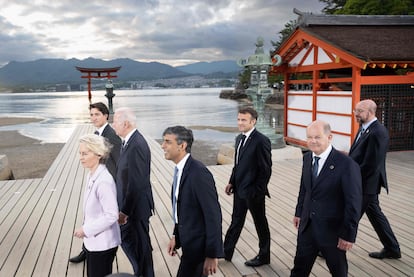G7 closes ranks to face the challenge of China’s rise
The world’s most industrialized democracies announced a series of cooperation mechanisms to control strategic investment flows to the Asian giant


The member nations of the G7, which groups together the world’s most industrialized democracies, closed ranks on the second day of a summit being held in the Japanese city of Hiroshima to send a message of firmness towards China. The final communiqué of the meeting and a specific document related to economic security contain a range of criticisms of Beijing and warnings about the group’s willingness to counter “malign practices” and acts of “economic coercion” in a coordinated manner, referring to Chinese maneuvers that seek to exploit vulnerabilities to take illegitimate advantage in the markets or influence the domestic or foreign policies of exposed countries.
The G7 nations — the United States, Japan, Germany, the United Kingdom, France, Italy, and Canada, with the added political representation of the European Union — expressed their willingness to maintain a “stable and constructive” relationship with Beijing and said that their actions are not aimed at harming its development capabilities. The group also stated its strategy is based on a rhetoric of “risk reduction,” linked to dependence on China’s manufacturing might, avoiding the harsher concept of decoupling, which has been championed by many voices in Washington over recent months. However, the G7′s conclusions highlight the worrying prospect of a very tense relationship between Western democracies — with their different sensitivities — and Beijing.
The most notable developments from the summit are in the economic-technological area, which is becoming increasingly relevant in terms of security and geopolitics. The partners announced the implementation of new cooperation mechanisms in this area. The G7 announced the establishment of a Coordination Platform on Economic Coercion with the objective of strengthening “our collective assessment, preparedness, deterrence and response to economic coercion.” The group also warned that those who attempt to use such practices would be met with countermeasures, “in accordance with our respective legal systems.” Many Western countries believe that China is leveraging its dominant position in multiple economic sectors to force policy changes, both in debtor countries and others that are reliant on its assets.
The member nations also announced mechanisms to control investments and exports to China in cutting-edge technologies that could potentially to boost military development. According to a European source, the aim is to plug existing gaps in the precise knowledge surrounding sensitive business transactions. From there, it remains to be seen how these limitations will develop. The U.S. has imposed restrictions on the export of high-end microchips to China, with the cooperation of countries including Japan and the Netherlands, where companies that are indispensable in the production chain are based. In addition, synergies will be promoted to achieve more resilient supply chains and infrastructures while reducing dependencies that expose developing countries to economic coercion.
The final communiqué stresses that the group is not seeking a decoupling but has settled on a policy of risk reduction, which has been the EU’s stance for some time. The text confirms a shift in Washington’s position that had been apparent in two important speeches in recent weeks — one by Secretary of the Treasury Janet Yellen and the other by National Security Advisor Jake Sullivan.
The communiqué also contains several geopolitical messages for Beijing. The G7 has called on China to use its influence on Russia to persuade Moscow to end its war in Ukraine and for Russian forces to withdraw from occupied territories; it also expressed its “serious concern” about developments in the East and South China Seas and expressed its opposition to attempts to change the status quo by force or coercion.
The Ukraine war
The Russian invasion of Ukraine was the other big issue on the agenda in Hiroshima, where Volodymyr Zelenskiy arrived on Saturday in an unannounced visit. Prior to the arrival of the Ukrainian president, the U.S. provided Kyiv with a major coup by opening the door to the provision of F-16 fighters while President Joe Biden endorsed the implementation of a training system for Ukrainian pilots. Sullivan added in no uncertain terms: “As the training unfolds in the coming months, we will work with our allies to determine when planes will be delivered, who will be delivering them, and how many.”
Furthermore, the G7 gave impetus to a new round of sanctions and restrictions against Moscow, at the same time as Washington announce plans for a fresh $375 million military aid package for Kyiv. In a specific communiqué on Ukraine, the group stated that “a just peace cannot be achieved without the complete and unconditional withdrawal of Russian forces, and this must be included in any call for peace.” The G7 remains strongly committed to supporting Kyiv and underlining there can be no negotiations involving Ukraine without Ukraine’s consent, on the premise that the aggrieved party has the right to set the terms of an eventual dialogue.
Sign up for our weekly newsletter to get more English-language news coverage from EL PAÍS USA Edition
Tu suscripción se está usando en otro dispositivo
¿Quieres añadir otro usuario a tu suscripción?
Si continúas leyendo en este dispositivo, no se podrá leer en el otro.
FlechaTu suscripción se está usando en otro dispositivo y solo puedes acceder a EL PAÍS desde un dispositivo a la vez.
Si quieres compartir tu cuenta, cambia tu suscripción a la modalidad Premium, así podrás añadir otro usuario. Cada uno accederá con su propia cuenta de email, lo que os permitirá personalizar vuestra experiencia en EL PAÍS.
¿Tienes una suscripción de empresa? Accede aquí para contratar más cuentas.
En el caso de no saber quién está usando tu cuenta, te recomendamos cambiar tu contraseña aquí.
Si decides continuar compartiendo tu cuenta, este mensaje se mostrará en tu dispositivo y en el de la otra persona que está usando tu cuenta de forma indefinida, afectando a tu experiencia de lectura. Puedes consultar aquí los términos y condiciones de la suscripción digital.








































